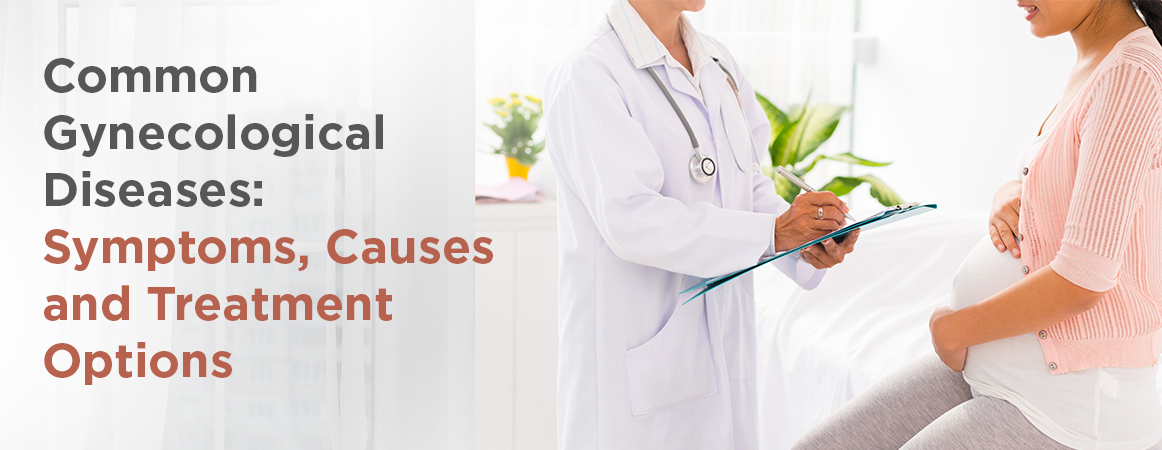
Gynecological diseases are a group of medical conditions that affect the female reproductive system. These conditions can be caused by a variety of factors such as hormonal imbalances, infections, and growths. They can range from mild to severe and can significantly affect a woman’s health and quality of life.
Understanding the symptoms, causes, and treatment options for common gynecological diseases is essential for early diagnosis and effective management of these conditions. You can consult the top gynecologists in Karachi at Memon Medical Institute Hospital, the best gynecologist hospital in Karachi.
Let’s discuss some of the gynecological problems, the various symptoms associated with each condition, their causes, and available treatment options.
When endometrial tissue, which borders the uterus, begins to protrude from it, the disorder is known as endometriosis. This tissue can grow on the ovaries, fallopian tubes, bladder, and other organs in the pelvis.
Symptoms of endometriosis can include painful periods, pain during intercourse, and infertility. Although the specific etiology of endometriosis is unknown, hormonal abnormalities are likely to be a contributing factor.
Medication, surgery, or a combination of the two are all possible forms of treatment.
An infection of the reproductive organs known as pelvic inflammatory disease develops when germs from the vagina or cervix move to the uterus, fallopian tubes, or ovaries.
Pelvic pain, fever, and unusual vaginal discharge are PID symptoms that might occur. PID can cause long-term damage to the reproductive system, including infertility. Sexually transmitted diseases are the most typical cause of PID.
Treatment options for Pelvic Inflammatory Disease (PID) include antibiotics and sometimes surgery.
Fibroids are noncancerous growths that form inside or close to the uterus. They can vary in size from small to very large and can cause heavy menstrual bleeding, pelvic pain, and pressure on the bladder or bowel.
Although the specific reason for fibroids is unknown, it is believed that hormone imbalances are a contributing factor. Visit the gynecologist specialist in Karachi at MMI Hospital to know the exact cause of fibroids.
Medication, surgery or a combination of the two are all viable treatment options for fibroids.
Developing on or inside the ovaries, ovarian cysts are fluid-filled sacs. Although benign in most cases, certain cysts can be malignant.
Ovarian cysts can cause irregular periods, bloating, and pelvic pain. The exact cause of ovarian cysts is not known, but they are thought to be related to hormonal imbalances.
Treatment options for ovarian cysts can include medication or surgery, depending on the size and type of cyst.
The ovaries are affected by the hormonal condition known as polycystic ovarian syndrome. Women with PCOS have multiple small cysts on their ovaries and may have irregular periods, excessive hair growth, and acne. PCOS can also cause infertility and other health problems such as diabetes and heart disease.
The exact cause of PCOS is not known, but it is thought to be related to insulin resistance and hormonal imbalances.
Treatment options for PCOS can include lifestyle changes such as diet and exercise, medication, and sometimes surgery.
Vaginal infections are caused by an overgrowth of bacteria or yeast in the vagina. The most common types of vaginal infections are bacterial vaginosis and yeast infections.
Symptoms of vaginal infections can include itching, burning, and abnormal vaginal discharge.
Treatment options for vaginal infections can include over-the-counter medication or prescription medication. Consult a gynecologist specialist at Memon Medical Institute Hospital.
Sexually transmitted infections spread through sexual contact. The most common types of STIs include chlamydia, gonorrhea, and human papillomavirus (HPV).
Symptoms of STIs can vary but can include pelvic pain, abnormal vaginal discharge, and pain during intercourse. If left untreated, STIs can cause long-term damage to the reproductive system and can even be life-threatening.
Treatment options for STIs can include antibiotics, antiviral medication, and sometimes surgery.
Gynecological diseases can have a significant impact on a woman’s physical and emotional well-being. Identifying and managing these conditions promptly is crucial for maintaining reproductive health and preventing long-term complications. Take charge of your health and seek appropriate medical attention from the gynecologists in Karachi when necessary.
Regular gynecological exams and screenings can also help to detect these conditions early and improve outcomes. Additionally, lifestyle modifications such as maintaining a healthy weight, exercising regularly, and practicing safe sex can help reduce the risk of developing gynecological diseases.
In a bustling city like Karachi, where every corner hosts a myriad of medical practitioners,…
Various factors can disrupt skin health, leading to a myriad of skin problems. Understanding the…
For those suffering from kidney stones, the pain can be excruciating, impacting daily life and…
Acidity, also known as acid reflux or heartburn, is a common digestive disorder. It happens…
Tonsillitis, an inflammation of the tonsils, can range from a minor nuisance to a serious…
Bawaseer, also known as hemorrhoids, is a medical condition characterized by swollen or inflamed veins…